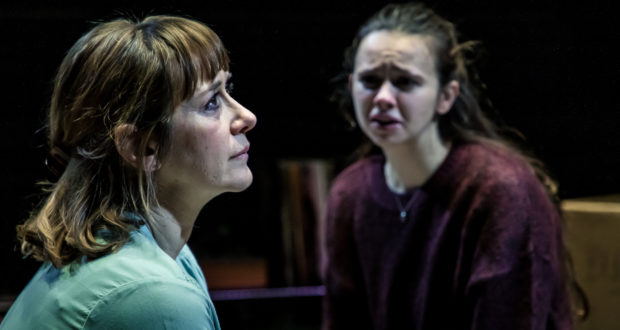A strong and polished production of Lucy Prebble’s debut play which hits differently in 2020Summary
Rating
Excellent
The Sugar Syndrome is one of those plays where you need a proper sit down after you’ve watched it. Your mind doesn’t quite know what to think. At least mine didn’t. Lucy Prebble’s play centres on Dani, a 17 year old who has met, and enjoys talking to, Lewis and Tim on an internet chatroom. Her exchanges with Lewis aren’t too far away from a couple of Tinder texts nowadays; flirty, yes, but nothing too scandalous. However it’s when we learn that she’s posing as a young boy to talk to Tom that things start to take on a darker tone.
Dani constantly hops between the chatroom and real life. This is shown through the set and lighting, designed by Rebecca Brower and Elliot Griggs. The playing space is a black square enclosed by a raised platform, and above the stage is a square rig of LED lights. When characters are in the chatroom they stand on the platform and the LED lights flicker blue. Dani jumps from one to the other. This effectively shows how quickly Dani flicks from the virtual to the real, constantly blurring the two. It all seems like a game to her.
The set is minimal: occasional props are strewn across the stage, while two child swings are lowered from the ceiling. This really allows the actors to own the playing space. Prebble’s writing seamlessly oscillates from comic to tragic and keeps you engaged despite the upsetting subject matter. The show is beautifully cast and directed, with actors who have a real synergy and naturally play off each other. Their performances are not to be missed.
The first half had me gripped and left me wondering where Prebble would take us next. However I felt like the second half lost its steam ever so slightly, with some plot lines feeling a bit too obvious and forced, in particular Dani and Tim’s growing intimacy. The fast paced rhythm of the first half slowed, and instead we had to watch as Dani spiralled into chaos. The ending felt somewhat predictable, which gave a sense of dread as we watched, but didn’t have quite as much of an effect as intended. As a quick note there is one particular scene near the end that I found quite distressing, so I would advise audience members to have a good read of the trigger warnings when booking to see the show.
The Sugar Syndrome feels quite dated in 2020. Not only from a technical point of view, in terms of how chatrooms were in 2003, versus the plethora of dating apps available nowadays, but also in the way it deals with its subject matter. The character of Tim is written as a charismatic paedophile, which doesn’t quite sit right. Since the play’s premiere in 2003 we have seen a multitude of sexual abuse scandals come into the limelight, with the uncovering of Jimmy Savile and Harvey Weinstein for example. As the play unfolds you can’t stop yourself from asking ‘where are the victims?’ ‘Why are we hearing from the perpetrator?’ ‘Why is Tim being given a platform?’ Watching this play nowadays makes you wonder whether things have truly changed in terms of the way victims and their testimonies are treated. It’s a thought-provoking piece, but is definitely of its time and seems to have lost some of its relevance and poignancy in 2020.
Author: Lucy Prebble
Director: Oscar Toeman
Booking Link: https://www.orangetreetheatre.co.uk/whats-on/the-sugar-syndrome
Booking Until: 22 February 2020
 Everything Theatre Reviews, interviews and news for theatre lovers, London and beyond
Everything Theatre Reviews, interviews and news for theatre lovers, London and beyond



